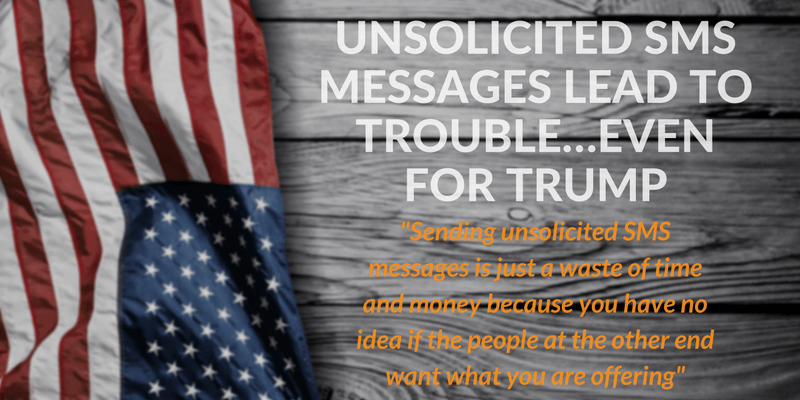What You Can Learn From a Bad SMS Message

In last week’s blog I covered how the Trump campaign sent unsolicited SMS messages to voters. This week I’m stuck on the same topic, but from a totally different angle: what we can learn from that failure. Because honestly, their biggest issue might not be violating the law. It might be the people they have writing their SMS messages.
It’s time to dissect the message that spawned the law suit, and learn what we can from it.
The message apparently read,
“Reply YES to subscribe to Donald J. Trump for President. Your subscription will help Make America Great Again! Msg&data rates may apply.”
So let’s look at that message, bit by bit and decide whether or not it follows best practices. I’m going to use a simple pass/fail test for each of four SMS marketing best practices. I’ll use the results as a tool to discuss the proper way to write an SMS message.
#1 Identify yourself: Fail, then pass
The campaign was sent from a shortcode, so it wouldn’t be immediately clear who sent it. Initially, people would wonder who it was from. But while the message doesn’t start off saying who it’s from, it does get to it in the first sentence. That’s why it gets both a pass and a fail.
Best practice is to include your name or an identifiable abbreviation at the very beginning of a message that lets the customer immediately know who it’s from. It avoids confusion, and potential lawsuits. Of course Trump isn’t being sued for failure to identify, but others have been. There was one UK music festival that sent everyone on their list a message, but instead of using their name, they made it appear to be from “Mum”. They thought it was funny. Some people didn’t agree. If you want, you can read about what happened in this blog.
#2 Call to action (CTA): Pass
It is clear what they want you to do: reply YES for a subscription. Not much more to say about that – ok there is, but it all falls under #3.
#3 Clear offer: Fail
Or as my gamer children would say, “EPIC fail!” Technically, I guess you can say the offer is a subscription. But what am I subscribing to? Will I get more messages? Will it cost me money? Am I committing to something? And most of all, how will a text “Make America Great Again”? That’s the slogan of the Trump campaign and easily recognisable. But it’s horribly misused here.
I can’t know how long any of the recipients examined this message when they got it. But I would have looked long and hard at it (given the nature of this blog and my natural inquisitiveness!). A contribution to Trump’s campaign would certainly go towards the effort to “Make America Great Again” because it would directly support him. A vote for him would support him and his cause too, but a text? Since you can’t vote via SMS (not for president anyway), are they asking for money? This train of thought would leave me with one conclusion: subscription = donation. But of course the message says nothing about money, or if I’m agreeing to pay something by replying “YES”. What does it mean?
If your messages leave your customers this confused, you’re probably going to have a very low ROI. It’s always best to test the copy of your SMS messages to make sure they are clear. There are a couple of ways to do this:
- Send to a small segment: If you have a large enough list, test the message with a small subset of the larger list. Or send a couple different versions of the message to different subsets. Then use the one that does the best. If neither of them do well, then go back and write a new message or tweak the ones you have until you get a better result.
- Wide internal review: It’s almost always hard to spot the problems with something we’ve created, especially when we’re immersed in it. So before you send that message to your whole list, have other people in the company review it. Get a cross-section of people if possible. The marketing team might get what you wrote, but the IT, sales, and HR people may have no idea what you mean (because they aren’t working the campaign like you are). And if they don’t get it, there’s a good chance your customers won’t either.
#4 Option to opt out: Fail
The end of the message did let people know that responding might cost them money in terms of sending the SMS reply: “Msg&data rates may apply”. But what isn’t included is a way to stop receiving the messages.
There should always be a very clear way for a recipient to opt out of all future messaging. Something like “Reply STOP to cancel”. This is required in SMS marketing messages in both the US and the UK.
It’s likely that the Trump message was a one-off based on the reports of the law suit. Perhaps this is why the author of the message didn’t feel the need to include the option for opting out. I haven’t seen any complaints of multiple messages being received – but it’s still early. Other people may come forward with more details as the case moves through the courts.
Since the Trump campaign has been silent about the issue, and the message is so difficult to interpret, it’s really impossible to know what the author was thinking.
What do you think? Was I too harsh on this message? Let me know in the comments.
Related Articles
Proof SMS Messaging Gets Results: Giveaways and Contests
Companies use contests and giveaways all the time. It turns out that doing them over SMS messaging works really well, and offers some advantages over other channels. Read our blog to see the types of results various companies achieved when using SMS giveaways.
Unsolicited SMS Messages Lead to Trouble…Even for Trump
Late last month reports surfaced that the Trump US presidential campaign had sent unsolicited SMS messages to voters in the Chicago area. One man, Joshua Thorne, and his lawyers have filed a class-action lawsuit alleging the Trump Campaign violated the Telephone Consumer Protection Act (TCPA, the US equivalent of the PECR).
Here’s Why SMS Marketing Is Literally The Best Idea Ever
Is SMS marketing the worst idea ever? That’s the opinion of one author in Entrepreneur Magazine. He gives five reasons why companies should never bother sending SMS messages to customers. I take him on, point by point to show why he’s wrong and SMS marketing is the best idea ever.
3 Reasons Why Enterprises Shouldn’t Build Their Own SMS Gateways
Enterprises are large companies. Sometimes that means they think they should be able to do everything themselves. But when it comes to SMS messaging, building an in-house gateway is more difficult than you might think. Read why finding a good SMS service provider is a better option.
SMS Marketing – Steering Clear of Spamming and Harassment
Executed properly, SMS direct marketing is a hugely effective and successful means of building customer loyalty and improving sales. But even genuine and honest marketing companies can suffer huge damage to reputation or even break the law through simply lacking knowledge or not double-checking before releasing campaigns. Read this article to learn more about the definitions of spamming and harassment, current UK law and how to avoid simple but costly mistakes.
SMS Marketing Disasters – and How to Avoid Them
SMS Marketing, also known as test message marketing, is one of today's most powerful and cost efficient marketing tools when used correctly and offers endless opportunities with a little creativity added to the mix. However, whether careless or intentional, some mistakes can be harmful to your brand and reputation - as well as leaving you in legal trouble in certain circumstances. Luckily, this is extremely rare and it is easy to stay safe and make sure your SMS Marketing is an all round success. In this article, we look at come examples of how not to do things and offer our advice for ensuring your campaigns are effective and profitable.
ICO issues a huge fine for massive illegal SMS campaign
ICO, the Information Commissioner's Office, has recently imposed a huge fine on direct marketing company Help Direct UK for sending illegal SMS messages.
3 Important SMS Marketing Concepts You Need to Know
If you are looking to get going with SMS marketing it's worth learning a bit about the "tricks of the trade" so you avoid the common pitfalls and get off on the right foot. Read about three important marketing concepts that will maximise your success in this venture.
Why Brits are Lucky When it Comes to SMS Spam
SMS spam is a problem worldwide. But in the UK, we’re less likely to get it than many other countries. Find out why that is, see some examples, and how you can do your part to keep your SMS messages free of spam.












